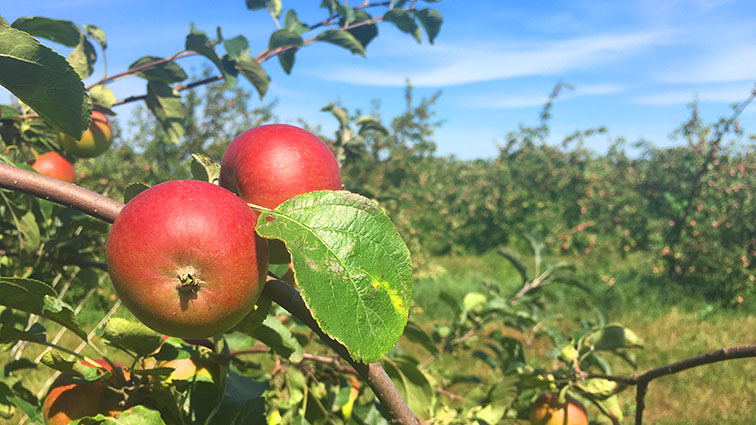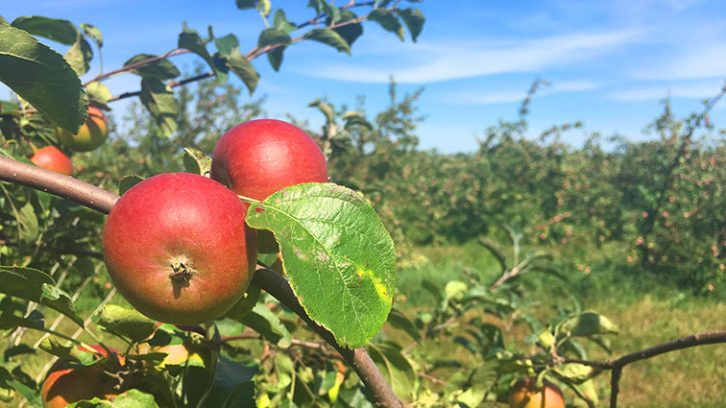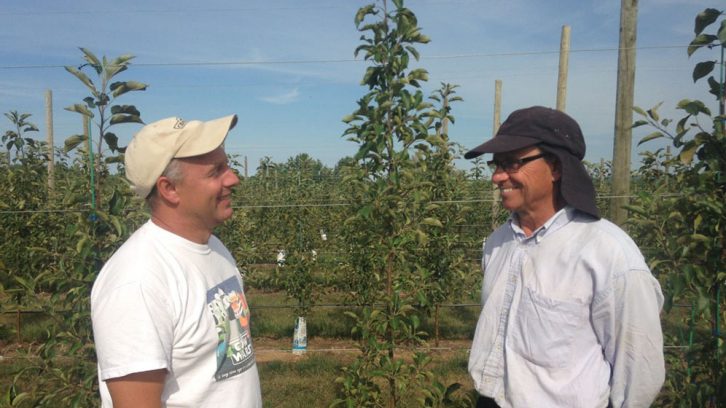Bad apples
How a poisonous review of a federal pesticide watchdog bruises Nova Scotia's apple industry

caption
Redfree organic apples at Boates Farm
caption
Redfree organic apples at Boates Farm
“I look forward to that taste all year,” she said.
But according to the January audit of the Commissioner of the Environment and Sustainable Development, unless the federal agency that regulates pesticides “quickens its pace” to protect Canadians, Stuppiello can’t be so sure that her Nova Scotian apple is safe to eat.
Health Canada’s Pest Management Regulatory Agency is responsible for ensuring that pesticides used to control everything from insects to mice are safe to use.
A look back
In 1610, the Annapolis Valley was the first place in Canada that apple seedlings were planted. Four centuries later, those trees have yielded some of the country’s largest share of commercial apple production.
Source: Statistics Canada & US Census Bureau: Trade Data Online
Apple U-picks have since become an increasingly popular destination for when the summer leaves begin to turn brown.
But Brian Boates is still the province’s only apple farmer with an organic U-pick operation.
In his late thirties, Boates made the “unconventional” decision to defend his orchard from unwanted pests with biopesticides: a “low-risk alternative” to the conventional “nasty stuff.”
Source: Agriculture and Agri-food Canada: 2013 Crop Profile for Apple in Canada. Photos taken by Nicoletta Dini at Boates Farm.
‘High Risk’
On its website, Health Canada maintains that, “to date, there is no evidence to indicate…that organic foods are safer…than conventionally produced food.”
But because of the “high risks” some of these chemicals pose to the environment and human health, Health Canada’s Pest Management Regulatory Agency is responsible for “stringently” regulating all pesticides that enter into Canada’s food system.
However, a January 26 report by the federal environment commissioner found that the agency did not always “prevent [these] unacceptable risks.”
Source: Consumer Product Safety Incident Reports: Health Canada
The audit
Julie Gelfand, the Commissioner of the Environment and Sustainability, said the federal regulatory agency did not “respect the timeline” to review outdated products, and was slow to remove pesticides that it officially considered unsafe – by about four to 11 years.
&amp;amp;amp;amp;amp;amp;amp;amp;amp;amp;amp;amp;lt;br /&amp;amp;amp;amp;amp;amp;amp;amp;amp;amp;amp;amp;gt;&amp;amp;amp;amp;amp;amp;amp;amp;amp;amp;lt;br /&amp;amp;amp;amp;amp;amp;amp;amp;amp;amp;gt;&amp;amp;amp;amp;amp;amp;amp;amp;lt;br /&amp;amp;amp;amp;amp;amp;amp;amp;gt;&amp;amp;amp;amp;amp;amp;amp;lt;br /&amp;amp;amp;amp;amp;amp;amp;gt;&amp;amp;amp;lt;br /&amp;amp;amp;gt;&amp;amp;lt;br /&amp;amp;gt;&lt;br /&gt;<br /><br />
&amp;amp;amp;amp;amp;amp;amp;amp;amp;amp;amp;amp;lt;a href=”https://www.documentcloud.org/documents/3031681-AUDITOR-s-REPORT/annotations/314667.html”&amp;amp;amp;amp;amp;amp;amp;amp;amp;amp;amp;amp;gt;View note&amp;amp;amp;amp;amp;amp;amp;amp;amp;amp;amp;amp;lt;/a&amp;amp;amp;amp;amp;amp;amp;amp;amp;amp;amp;amp;gt;&amp;amp;amp;amp;amp;amp;amp;amp;amp;amp;amp;amp;lt;br /&amp;amp;amp;amp;amp;amp;amp;amp;amp;amp;amp;amp;gt;&amp;amp;amp;amp;amp;amp;amp;amp;amp;amp;lt;br /&amp;amp;amp;amp;amp;amp;amp;amp;amp;amp;gt;&amp;amp;amp;amp;amp;amp;amp;amp;lt;br /&amp;amp;amp;amp;amp;amp;amp;amp;gt;&amp;amp;amp;amp;amp;amp;amp;lt;br /&amp;amp;amp;amp;amp;amp;amp;gt;&amp;amp;amp;lt;br /&amp;amp;amp;gt;&amp;amp;lt;br /&amp;amp;gt;&lt;br /&gt;<br /><br />
Contrary to its “statutory obligation”, the audit found that the regulatory agency was putting the needs of industry ahead of its mandate to protect the public health.
<br /><br />
<a href=”https://www.documentcloud.org/documents/3031681-AUDITOR-s-REPORT/annotations/314668.html”>View note</a><br /><br />
&amp;amp;amp;amp;amp;amp;amp;amp;amp;amp;amp;amp;lt;br /&amp;amp;amp;amp;amp;amp;amp;amp;amp;amp;amp;amp;gt;&amp;amp;amp;amp;amp;amp;amp;amp;amp;amp;lt;br /&amp;amp;amp;amp;amp;amp;amp;amp;amp;amp;gt;&amp;amp;amp;amp;amp;amp;amp;amp;lt;br /&amp;amp;amp;amp;amp;amp;amp;amp;gt;&amp;amp;amp;amp;amp;amp;amp;lt;br /&amp;amp;amp;amp;amp;amp;amp;gt;&amp;amp;amp;lt;br /&amp;amp;amp;gt;&amp;amp;lt;br /&amp;amp;gt;&lt;br /&gt;<br /><br />
&amp;amp;amp;amp;amp;amp;amp;amp;amp;amp;amp;amp;lt;a href=”https://www.documentcloud.org/documents/3031681-AUDITOR-s-REPORT/annotations/314667.html”&amp;amp;amp;amp;amp;amp;amp;amp;amp;amp;amp;amp;gt;View note&amp;amp;amp;amp;amp;amp;amp;amp;amp;amp;amp;amp;lt;/a&amp;amp;amp;amp;amp;amp;amp;amp;amp;amp;amp;amp;gt;&amp;amp;amp;amp;amp;amp;amp;amp;amp;amp;amp;amp;lt;br /&amp;amp;amp;amp;amp;amp;amp;amp;amp;amp;amp;amp;gt;&amp;amp;amp;amp;amp;amp;amp;amp;amp;amp;lt;br /&amp;amp;amp;amp;amp;amp;amp;amp;amp;amp;gt;&amp;amp;amp;amp;amp;amp;amp;amp;lt;br /&amp;amp;amp;amp;amp;amp;amp;amp;gt;&amp;amp;amp;amp;amp;amp;amp;lt;br /&amp;amp;amp;amp;amp;amp;amp;gt;&amp;amp;amp;lt;br /&amp;amp;amp;gt;&amp;amp;lt;br /&amp;amp;gt;&lt;br /&gt;<br /><br />
Source: AUDITOR GENERAL OF CANADA: The Commissioner’s Comments – Report 1 Pesticide Safety
Why one bad apple spoils the bunch
The federal regulatory agency’s problems highlighted in Gelfand’s audit directly come to bear on Nova Scotia’s apple industry.
Provincial pest management is directed through the non-profit agricultural corporation called Perennia.
The province is free to tighten restrictions or outright ban the use of registered pesticides that are approved by the government.
But Chris Duyzelshosh, Perennia’s tree fruit specialist, says he’s not concerned about the safety of any conventional pesticide that ends up in the organization’s 2016 Grower Management Guide – “as long as its registered and approved by the federal authority.”
The “active ingredients”

caption
Neighbours and competitors, Parker and Boates, are friends despite having different farming practices.
&lt;/p&gt;<br /><br />
&lt;p&gt;&lt;a href=”https://www.documentcloud.org/documents/3030484-PMRA-Annuak-Report-2014-15/annotations/314592.html”&gt;View note&lt;/a&gt;&lt;/p&gt;<br /><br />
&lt;p&gt;
Along with many other chemicals highlighted by the audit, metiram’s review hasn’t moved forward and it continues to be used today.
&amp;amp;amp;amp;amp;amp;amp;amp;amp;amp;lt;br /&amp;amp;amp;amp;amp;amp;amp;amp;amp;amp;gt;&amp;amp;amp;amp;amp;amp;amp;amp;lt;br /&amp;amp;amp;amp;amp;amp;amp;amp;gt;&amp;amp;amp;amp;amp;amp;amp;lt;br /&amp;amp;amp;amp;amp;amp;amp;gt;&amp;amp;amp;lt;br /&amp;amp;amp;gt;&amp;amp;lt;br /&amp;amp;gt;&lt;br /&gt;<br /><br />
&amp;amp;amp;amp;amp;amp;amp;amp;amp;amp;lt;a href=”https://www.documentcloud.org/documents/3030484-PMRA-Annuak-Report-2014-15/annotations/314592.html”&amp;amp;amp;amp;amp;amp;amp;amp;amp;amp;gt;View note&amp;amp;amp;amp;amp;amp;amp;amp;amp;amp;lt;/a&amp;amp;amp;amp;amp;amp;amp;amp;amp;amp;gt;&amp;amp;amp;amp;amp;amp;amp;amp;amp;amp;lt;br /&amp;amp;amp;amp;amp;amp;amp;amp;amp;amp;gt;&amp;amp;amp;amp;amp;amp;amp;amp;lt;br /&amp;amp;amp;amp;amp;amp;amp;amp;gt;&amp;amp;amp;amp;amp;amp;amp;lt;br /&amp;amp;amp;amp;amp;amp;amp;gt;&amp;amp;amp;lt;br /&amp;amp;amp;gt;&amp;amp;lt;br /&amp;amp;gt;&lt;br /&gt;<br /><br />
Phosmet is the only registered organophosphate in Perennia’s guide.
It belongs to a class of pesticides that the government has openly been trying to phase out through “The Pesticide Risk Reduction Program” and “National Strategy to Reduce the Risk of Organophosphate Pesticides in [Apple] Fruit Orchards.”
“There is an urgent need for […] safe and effective alternatives to control insect pests in orchards.”
-Agriculture and Agri-food Canada
However, Laurie Mosher, a clinical leader at the IWK, says the risk of poisoning is incredibly low. She says last year “less than five” of the 199 cases of pesticide poisonings reported to the hospital were from organophosphates.
But according to a David Suzuki Foundation 2007 report, official figures only “represent the tip of the proverbial iceberg.”
</p><br />
<p><a href=”https://www.documentcloud.org/documents/3026978-DSF-Pesticide-Poisoning/annotations/314533.html”>View note</a></p><br />
<p>
Putting things into perspective
Christopher Cutler, an associate professor of environmental science at Dalhousie University, says that “of course there are problems in the system.”
But he thinks Canadians are taking for granted just how regulated their pesticide agency really is:
As a member of Nova Scotia Beekeepers, four provincial agricultural departments are industry stakeholders in his research.
Lauren Stuppiello says she’s disappointed that the government’s regulatory process can “so easily” be bruised by the environment commissioner.
But the sweet thought of the fresh and sticky juice soon to run down her chin is “enough” for her to risk having just one more bite of the poisoned apple.
